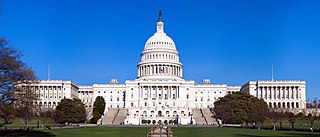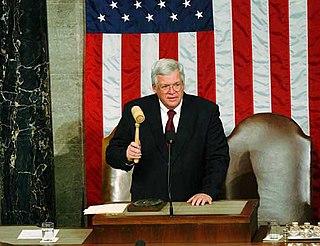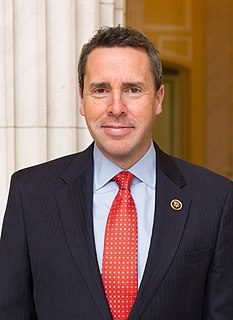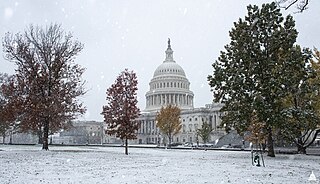This article needs additional citations for verification .(February 2013) (Learn how and when to remove this template message) |
| This article is part of a series on the |
| United States House of Representatives |
|---|
 |
| History of the United States House of Representatives |
| Members |
| Politics and procedure |
| Places |
The House Republican Conference is the party caucus for Republicans in the United States House of Representatives. It hosts meetings and is the primary forum for communicating the party's message to members. The Conference produces a daily publication of political analysis under the title Legislative Digest .

The United States House of Representatives is unofficially the lower house of the United States Congress, the Senate being unofficially the upper house. Together they compose the national legislature of the United States.
Legislative Digest is an official publication of the House Republican Conference. It serves as the primary source of legislative analysis and preview of floor activity for Republican Members of the United States House of Representatives. As such, it functions as the Republican counterpart to the Democratic Study Group. It originally was published weekly, but starting with the 104th Congress was published daily, and distributed in either printed or faxed form. Legislative Digest is currently published online.
Contents
The conference has a chair who directs day-to-day operations and who is assisted by an elected vice chair and a secretary. The current chair is Liz Cheney of Wyoming, who assumed the position in 2019. [1]

Elizabeth Lynne Cheney is an American attorney and politician serving as the U.S. Representative for Wyoming's at-large congressional district since 2017. Cheney is the House Republican Conference Chair, the third-highest position in GOP House leadership. She is the third woman elected to that position after Deborah Pryce and Cathy McMorris Rodgers.

These are tables of members from Wyoming of the United States Senate and United States House of Representatives.
In the 112th Congress, the chair was Jeb Hensarling of Texas, the vice chair was Cathy McMorris Rodgers of Washington, and the secretary was John Carter of Texas. For the 113th Congress (2013–2015), the party elected Cathy McMorris Rodgers as the Chair after a tough fight with conservative Tom Price of Georgia. They also elected Lynn Jenkins of Kansas to the position of Vice Chair and Virginia Foxx of North Carolina to the position of Secretary. [2]

Thomas Jeb Hensarling is an American politician who served as the member of the United States House of Representatives from Texas's 5th congressional district from 2003 to 2019. A member of the Republican Party, Hensarling chaired the House Financial Services Committee from 2013 to 2019, and chaired the House Republican Conference from 2011 to 2013. A leading opponent of regulating the financial industry, Hensarling has close ties to Wall Street, having received campaign donations from every major Wall Street bank as well as various payday lenders.
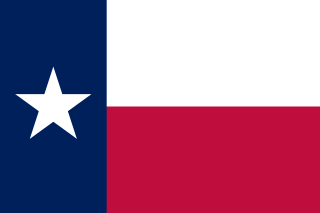
Texas is the second largest state in the United States by both area and population. Geographically located in the South Central region of the country, Texas shares borders with the U.S. states of Louisiana to the east, Arkansas to the northeast, Oklahoma to the north, New Mexico to the west, and the Mexican states of Chihuahua, Coahuila, Nuevo León, and Tamaulipas to the southwest, and has a coastline with the Gulf of Mexico to the southeast.

Cathy Anne McMorris Rodgers is an American politician who is the U.S. Representative for Washington's 5th congressional district which encompasses the eastern third of the state and includes Spokane, the state's second largest city. A Republican, McMorris Rodgers previously served in the Washington House of Representatives. From 2013 to 2019, she was the Chair of the House Republican Caucus.
Former chairs include Gerald Ford, John Boehner, Mike Pence, John B. Anderson, Dick Cheney, Jack Kemp, J. C. Watts, Deborah D. Pryce, and Adam Putnam.

Gerald Rudolph Ford Jr. was an American politician who served as the 38th president of the United States from August 1974 to January 1977. Before his accession to the presidency, Ford served as the 40th vice president of the United States from December 1973 to August 1974. Ford is the only person to have served as both vice president and president without being elected to either office by the Electoral College.
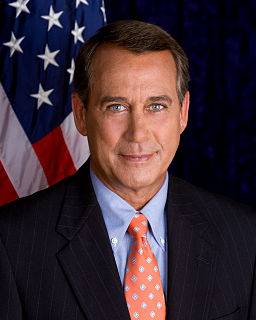
John Andrew Boehner is an American politician who served as the 53rd speaker of the United States House of Representatives from 2011 to 2015. A member of the Republican Party, he was the U.S. Representative for Ohio's 8th congressional district from 1991 to 2015. The district included several rural and suburban areas near Cincinnati and Dayton.

Michael Richard Pence is an American politician and lawyer serving as the 48th and current vice president of the United States. He previously was the 50th governor of Indiana from 2013 to 2017 and a member of the United States House of Representatives from 2001 to 2013. He is the younger brother of U.S. representative Greg Pence.





